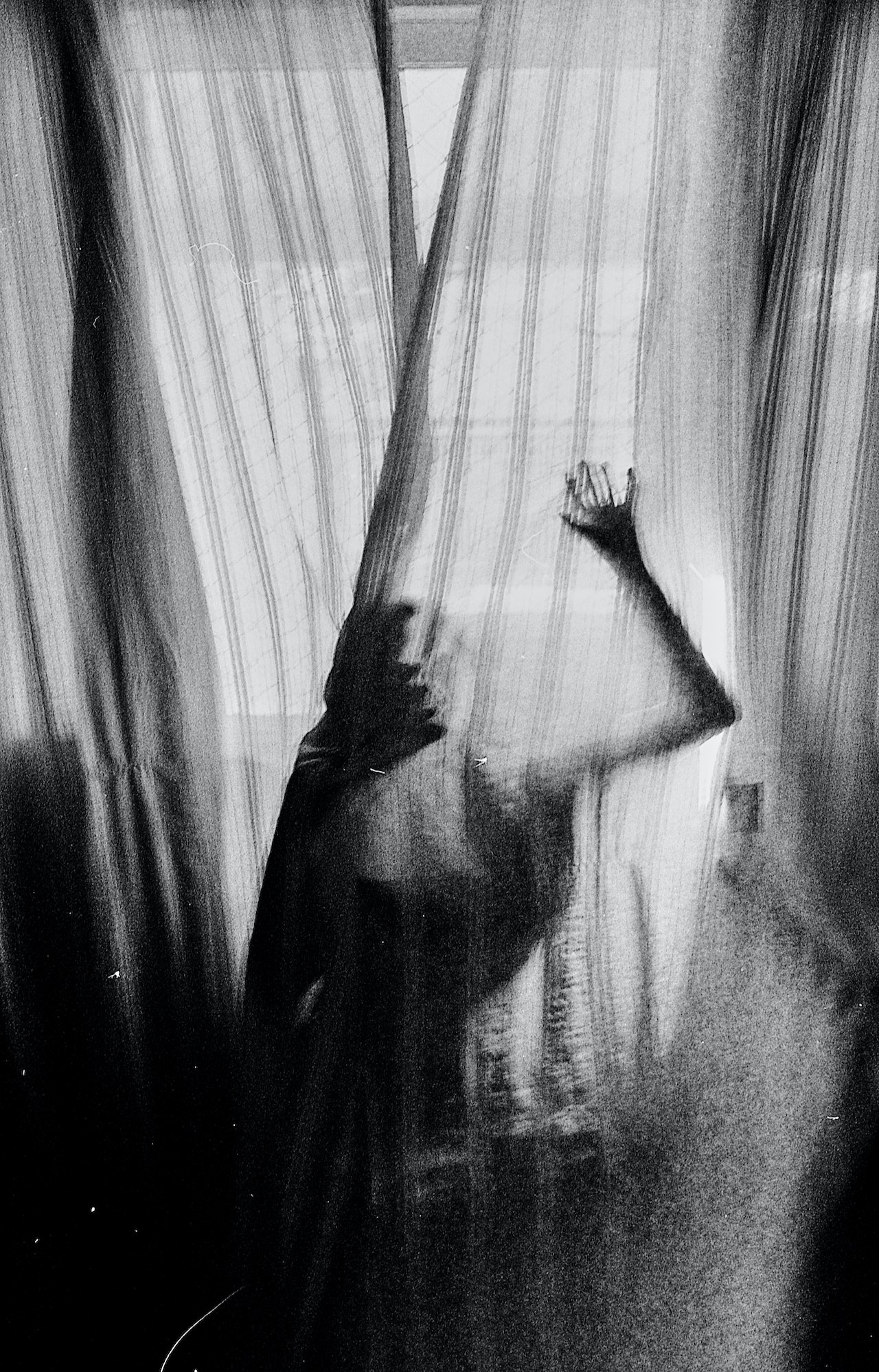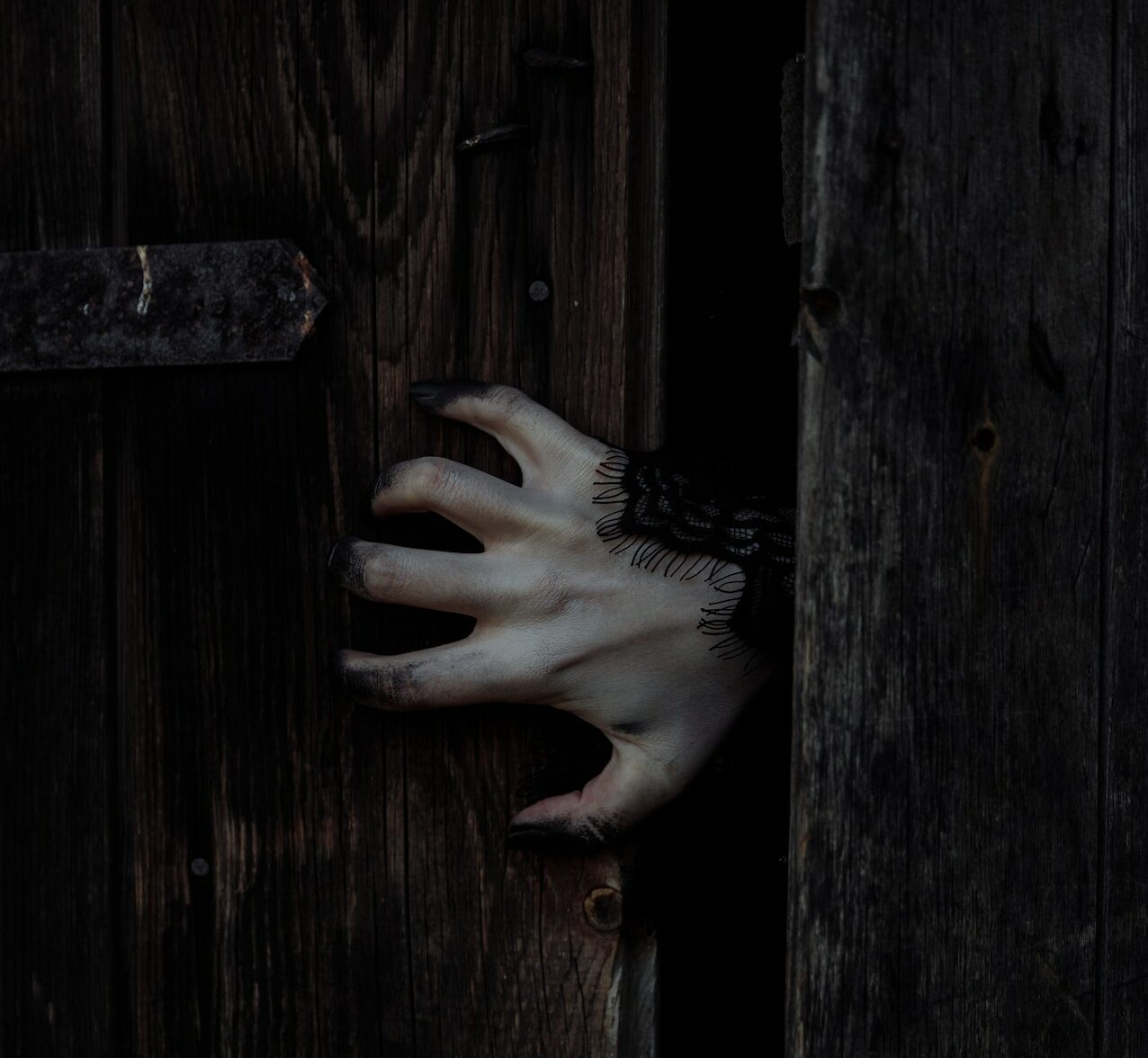Poltergeists: Noisy Ghosts
Happy Weird Wednesday! Today we’re going to investigate that weird knocking sound coming from the walls. It could be the water pipes…or something else.
A poltergeist (translated from German as noisy ghost, knocking ghost, rumbling ghost, or loud spirit) is not like other ghosts. While hauntings tend to stretch over years or even centuries, poltergeist activity often lasts for only a few months. And unlike most ghosts, poltergeists often focus their energy on a particular person, rather than a place. But the biggest distinction is danger: while the White Lady who climbs the stairs may spook you, a poltergeist is said to be capable of doing you actual harm.
So how does one know they’ve got a noisy ghost? Oh, they’ll know. Phenomena involved with poltergeists include objects being flung around, particularly rocks; furniture moving across the floor; bad smells (it’s worth noting that many non-poltergeist hauntings include pleasant smells, such as Grandma’s perfume); doors and windows opening and shutting; and electrical effects: lights flickering, bulbs spinning in their sockets, and the creepiest bit, powered objects operating without electricity or batteries.
That’s the more normal stuff. Also reported have been lit matches falling through the air, shrieking noises, telephones constantly dialing certain numbers, water pooling on the floor (that would actually be kind of helpful if it coincided with the matches), and even a pair of gloves floating around, touching things as if some invisible hand was wearing them. And of course, assaults: pinching, biting, hitting, and pushing. The Bell Witch was even said to have murdered a man via poison.
But the most common sign of a noisy ghost is, well, noise: knocking sounds coming from the walls, floor, or furniture. Sometimes, the raps seem random, and other times they can function as a method of communication with the spirit: (rap once for yes, twice for no).
There are, of course, conflicting explanations given for poltergeists, including plain old hallucinations, and credulous witnesses. We’re going to look at some major theories, and scare up a few writing prompts.
Theory 1: The classic poltergeist
And by this we mean some random malevolent force that plays drum solos on the walls for a while and then wanders off someplace else with no identifiable reason for starting or stopping. It seems to have hands, because it pinches and scratches people, but other than that, it isn’t particularly human, and doesn’t communicate in any way. These dudes are good for horror stories with no satisfying explanation.
A couple of disembodied prompts:
- Let there be music from regions beyond. Maybe classic poltergeists don’t communicate, but what if their noises were still not random? It’s not so much a noisy ghost as a musical one, tapping out melodic rhythms on the walls. What songs would it play? Would they be identifiable as human songs, or would humans learn the rhythms and then add instruments? What would happen if you played a song you learned from a poltergeist?
- Feeling the pinch. What if the only manifestation of a certain poltergeist is physical harm? No knocking or smells or anything else. What explanation would people come up with for this? Probably not a supernatural one. There’s an old trope where you can get a group of people to fight by surreptitiously hitting one and framing the guy sitting next to them. But what if the pinching happened only in the middle of the night? Or while someone was alone in a house? They’d probably be convinced they had an intruder, which is scary enough on its own.
Theory 2: We’ve got a ghost!
“Ghost” here meaning an actual dead person with a name and history. In the 1850’s, the Fox sisters from New York claimed to be in contact with the ghost of a murdered peddler, who communicated with them via rapping noises. (They later recanted.) But other poltergeist activity has been attributed to ghosts, like that of Major Robert Steuart at Ballechin House in the 1870’s, or Bill, aka the Enfield poltergeist, 100 years later (you can meet him in The Conjuring 2 movie). Sometimes these guys even manifest in classic ghost-style, as an apparition. You’re also much more likely to get communication via wall-rapping if you’ve got a (formerly) human poltergeist.
Some spirited prompts:
- The touch of death. What drives these particular ghosts into being so interactive with their surroundings, hitting walls and moving furniture? Most ghosts are thought to be incapable of touching anything. Are poltergeists powered by some evil source? Are they especially angry about their death, unsolved murder, or how the new tenants redecorated the house? Are they driven by a need to communicate? And remember, while the spirits listed above did not seem to have a hankering to harm humans, with a poltergeist, that is not guaranteed. Even if they’re not into scratching and pinching, people can get hit by flying objects, or caught in a burning house. What makes these particular ghosts so violent?
- Pious fraud. Let’s go the other direction and say you actually do have a classic haunting: a dead person unable to interact with the world of the living. But you’ve also got a living psychic who can see and hear this ghost. Only nobody believes her. Might she fake the rapping and flying objects as a way to get this ghost’s story out there, perhaps accusing their murderer from beyond the grave? Of course, if she’s exposed as a fraud, nobody will believe anything she says ever again. (Pious fraud)
Theory 3: Demons and black magic
When a poltergeist responds to an exorcism, this is the usual explanation. These cases vary: you can have an unspecified demonic force, or a named agent (like the Bell Witch). These types of poltergeist differ from ghosts in that demons were never human, and that people using black magic can actually still be alive while causing their mischief.
A couple of malevolent prompts:
- Finders, keepers. Demons are a good explanation for poltergeists that haunt people rather than places, and a demonic poltergeist can include possession of a human victim. The sky’s the limit with demons forcing possessed people to do things, and perhaps this one wants to go poltergeist-ing. But why? Would they enjoy getting their possessed person accused of faking phenomena? Or do they want people to think their person has supernatural powers, like pyrokinesis (fire-starting)? Might there actually be an advantage to a person and their possessing demon if others think the victim is super powerful?
- Toil and trouble. There are a few ways to go with black magic as far as plots: you could have a story of misogynistic violence where a woman is falsely accused of activity that’s actually being performed by a real poltergeist or a human faker (or both). You could have a person using their powers against people who deserve it (maybe avenging a woman falsely accused?). Or you can have a person who just likes casting evil spells, with their motivation anywhere from tragic backstory to wanting to watch the world burn.
Theory 4: It’s a person, and they don’t know they’re doing it
The agent theory! This was really popular among 1900’s psychical researchers. It came from observations that poltergeist activity is often centered around a particular person, most commonly a young woman under the age of 20. That means rather than an otherworldly being or energy causing these phenomena, it’s subconscious telekinesis. A young woman in a stressful household, with repressed anger and often a poor state of physical or mental health, is actually moving objects with the power of her mind, while being totally unaware of it. The researchers even postulated that visible apparitions could be created by some aspect of the agent’s personality, projected into space.
Crucially, these poltergeists do not communicate, because there is no intelligence driving them, they’re just some sort of reflex. When the young woman gets older or ceases to be so stressed, the activity stops. Note that this theory is unsurprisingly pretty sexist, so feel free to have a person of any gender (or age) as your agent.
Some secret agent prompts:
- Out for vengeance. What stress could be so bad that it causes subconscious rock throwing? Abuse and bullying are candidates. According to the theory, the poltergeist activity is random, but you could have a plot where a particular tormentor of the agent becomes the poltergeist’s favorite target. This could be violent scratching and so on, but it could also manifest subtly as a run of really bad luck: tires punctured by rocks, expensive heirlooms lost or broken, watches never keeping the right time. You could also have an agent get wise to their abilities and start to use them on purpose against their tormentor and anybody else they please.
- The friendly ghost. What if you had the opposite trigger: an agent who has a really good life and is so happy that weird but lucky things happen around them all the time? Their friend loses a shirt button but it ends up in their pocket. Their cash-strapped parent can always find a heap of coins between the couch cushions. Their little sister doing math homework hears the answers rapped out on the kitchen table. What would happen if the agent ever figured out that they were the source of everyone’s luck? Or if their life took a turn for the worse?
Theory 5: It’s a person, and they do know they’re doing it
No, I don’t mean Carrie. I mean faking it. Not pious fraud, straight-up fabrication by a non-believer. It might be a prank by bored kids that gets out of hand, a deceptive medium performing for paying clients, a ghost hunter looking for social media followers, or a journalist who needs a big story. Whatever the motivation, faking a poltergeist involves anything from hiding behind the couch and throwing stuff to magnets, wires, and all the different ways to make knocking sounds.
A couple of sneaky prompts:
- Be careful what you wish for. There are two possibilities with this sort of activity: either the faker gets caught, or they don’t. The consequences depend on who’s committing fraud. Kids who get caught can get grounded, kids who don’t can accidentally cause a media phenomenon (as in the Enfield case). Deceptive mediums can get arrested for fraud, or make a lot of money, depending on how convincing they are. Ghost hunters in the age of social media might choose to refute any fakery accusations, causing a lot of controversy, which gets more social media views. So they might make it big even if they do get caught. (It’s worth noting that when the Fox sisters recanted, many people kept on believing anyway, probably partly because they had a lot invested in the story.) A journalist getting caught might have to chose another career, but if their story is believed, they might be expected to top that story with something cooler, over and over again, making it more likely that they will eventually get caught.
- The secret third thing. What if the fraudulent activity suddenly becomes real? One day the faker is putting kids’ toys on wires, and the next something is throwing dishes at their head. They’re all set up to fake rapping noises but something else starts making them first. Are they being out-conned by another performer? Did they accidentally attract a real poltergeist somehow? Are they being punished for their fraud by supernatural beings?
Thanks for spending your Weird Wednesday here! Remember, if you hear knocking noises…don’t ever knock back.
Want to chat about the blog? Did you use one of the prompts? Hit me up on social media.
Check out a related Weird Wednesday post: The Amityville Horror: Infamous American Haunted House
If you like ghostly mysteries, you can listen to my audio drama People Have to Know for free on the No Sleep Podcast. A radio reporter encounters supernatural evil during a death row interview.
You can also read my free queer romance You Don’t Say: When two fake psychic con men who secretly pine for each other are forced to work together to solve a disappearance, they discover that one of them is actually psychic. But which one?
Sign up for my free monthly newsletter and never miss a blog post! Or subscribe by RSS
Sources & further reading:
Guiley, Rosemary Ellen. “Crossroads.” The Encyclopedia of Ghosts and Spirits. Facts on File, 1992. On Goodreads
What Is a Poltergeist? A Guide to the Dangerous Ghosts: The Lineup
5 Violent Poltergeists That Terrorized People Around the World: The Lineup





